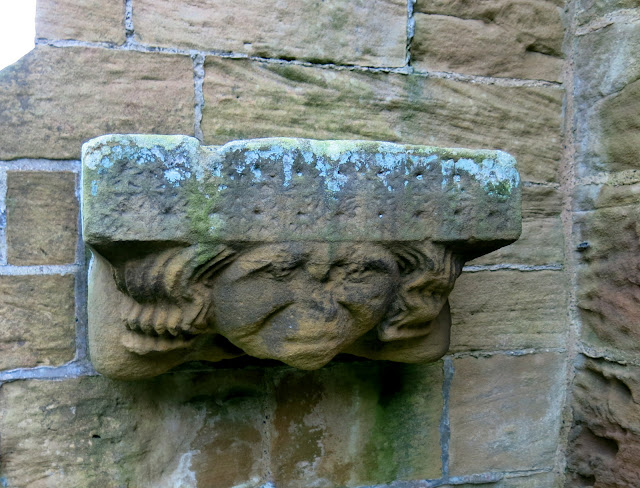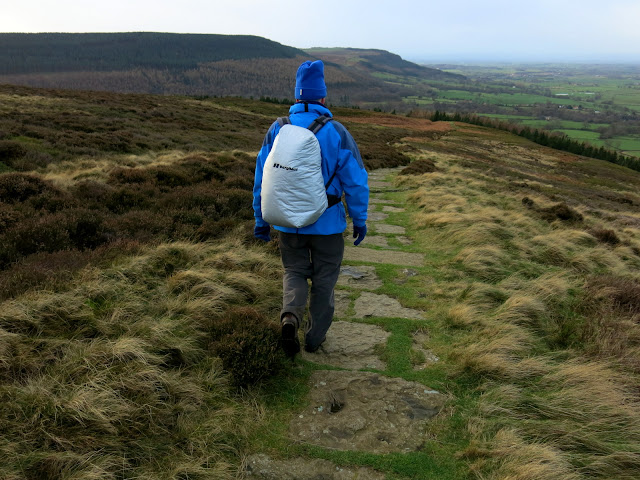Whorlton Castle and Church from Swainby
6 miles Cool and fine
Heavy rain for the last few days made us seek out a higher level walk where fields wouldn't be too waterlogged. We hadn't walked to Whorlton for over a year and this walk seemed to fit the bill. We parked at the roadside in Swainby and before crossing the river we noticed a restored pinfold, similar to the one at Osmotherley. A pinfold is where stray animals were kept until being reclaimed after payment of a fine. We must have walked past it several times before without noticing what it was. We then walked up the high street and turned left into a footpath just before the church.
 |
| Today's walk from The Walker's Guide to the Cleveland Hills |
 |
| Restored pinfold near the Blacksmiths Arms |
 |
| Swainby was a mining village so this weather-vane is very appropriate |
The footpath passes along the back of houses and we quickly left Swainby, which Tom Scott Burns informs us means 'Swain's Farm', from the old Norse name Sveinn. Our footpath soon joined a lane which took us very quickly to Whorlton Castle. TSB tells us that there have been a number of castles on this site, even before the Domesday Book records it as Wirueltun in 1086. William the Conqueror gave the manor to Robert Count de Mortain, and then it passed into the hands of the de Meynell family. The castle was surrounded by a deep moat over which was a drawbridge. In 1323 Edward II was known to have stayed at Whorlton Castle while hunting deer in North Yorkshire and during the Cromwellian period Royalists held the castle and were bombarded by Roundheads from Whorl Hill to the East and Toft Hill to the West.
 |
| Footpath through Swainby village |
 |
| Whorlton Castle from the road |
 |
| Inside the castle |
 |
| The rear of the building |
We wandered round the castle and admired its location, high on a hill and still showing the remains of a deep moat surrounding it. Holes in the stonework show where beams had once been fitted, probably supporting wooden buildings attached to the main castle.
We walked a little further along the road and came to the old Saxon church of Holy Cross. There is a tale that an underground passage links the castle to the nearby old church of Holy Cross and we decided to stop off to have a look round. The church was locked and we peered through the grill in the chancel door. We could just see the bog oak effigy of the second Lord Nicholas de Meynell who died in 1322, as described by TSB. (See here for description of bog oak) We explored the graveyard and its numerous ancient headstones, which looked quite eerie in the morning light.
 |
| Approaching Holy Cross Church |
 |
| Separate tower |
 |
| Face on stonework of church |
 |
| As good a view as we can get of DeMeynell's oak memorial |
 |
| Headstone from 1826 |
 |
| "Pass a few swiftly fleeting years, And all that now in bodies live, Shall quit like me the vale of tears, Their righteous sentence to receive" |
 |
| WW2 memorial stone at Holy Cross Church |
We returned to the lane and followed it to the junction with Whorlton Lane, where we climbed a stile into fields and headed straight towards Whorl Hill, which dominates the skyline. The field paths were not as muddy as we had expected, perhaps today's strong cold wind had dried them somewhat.
A steady climb took us into the trees of Whorl Hill (old Norse 'hvirfill' - 'high hill with a rounded top') and we continued to climb until our track levelled out and we circumnavigated the hill, just inside the tree line. TSB informs us that in 1810 one of Britain's largest hoards of Roman silver coins (weighing 2 stones) was dug up on Whorl Hill by a local farmer whilst ploughing his field. We followed the path with a fine view down to Swainby through the trees, until we dropped away from the main path to exit the woods at Bank Lane via the garden of a bungalow.
 |
| The trees of Whorl Hill in the distance |
 |
| Field paths to Whorl Hill |
 |
| Looking back to Holy Cross Church from the climb to Whorl Hill |
 |
| Up Whorl Hill |
 |
| The houses of Potto from Whorl Hill |
 |
| Circumnavigating the hill through the trees |
We turned right into Bank Lane and followed it uphill towards moorland and the trees of Faceby plantation. A short and steep climb through the trees brought us to a path below Live Moor, where we sheltered from the wind behind a stone wall to enjoy our coffee and scones.
 |
| Bank Lane towards Faceby plantation |
 |
| Climbing through the trees towards Live Moor |
 |
| We stop along here to enjoy our coffee.... |
 |
| ... before climbing to the top of Live Moor |
 |
| Looking back towards Whorl Hill |
On Live Moor we joined the Cleveland Way path, just below Gold Hill, and turned right to follow it straight into a cold head-wind. We followed the Cleveland Way until we descended down a slippery slope to Huthwaite Green where we were surprised to see an old railway goods vehicle at the side of the path. This reminded us that the mineral railway once ran up this valley into Scugdale, although little trace can be seen of it now.
 |
| Looking across at Scugdale from the Cleveland Way |
 |
| We remember this cairn as being much bigger years ago |
 |
| Approaching Huthwaite Green |
 |
| Old railway truck at path-side |
 |
| Crossing Scugdale Beck, the Cleveland Way acorn is on the bridge |
We crossed the beck and followed our path, still the Cleveland Way, across a couple of fields and then turned right into a distinct forest path. This led us alongside the beck for a mile and looking over to the east we could at all times see Whorl Hill and our outward path. Eventually our path fell gradually to join Coalmire Lane, the old Swainby to Sheepwash road, which we followed back towards the village.
 |
| Our path is in those trees |
 |
| Following the path towards Coalmire Lane |
 |
| Ornate weather-vane on farm building in Coalmire Lane |
We strolled into Swainby and followed the river through the village until we saw the Black Horse pub on our right. It seemed a shame to pass the pub on New Year's Eve without stopping to toast ourselves and everyone else, "To long drinks and short walks"
Happy New Year!
 |
| Swainby |
 |
| The Black Horse |
 |
| Happy New Year! |




No comments:
Post a Comment